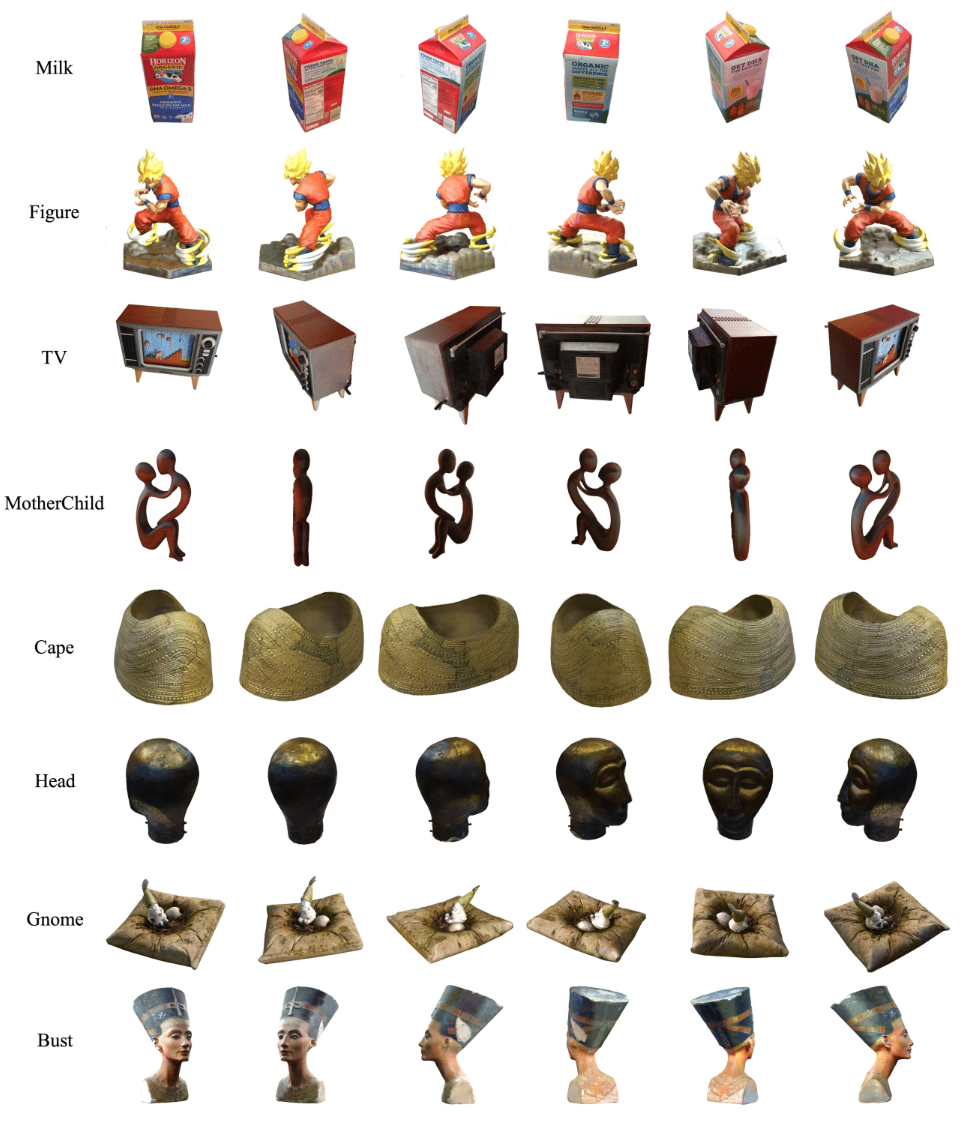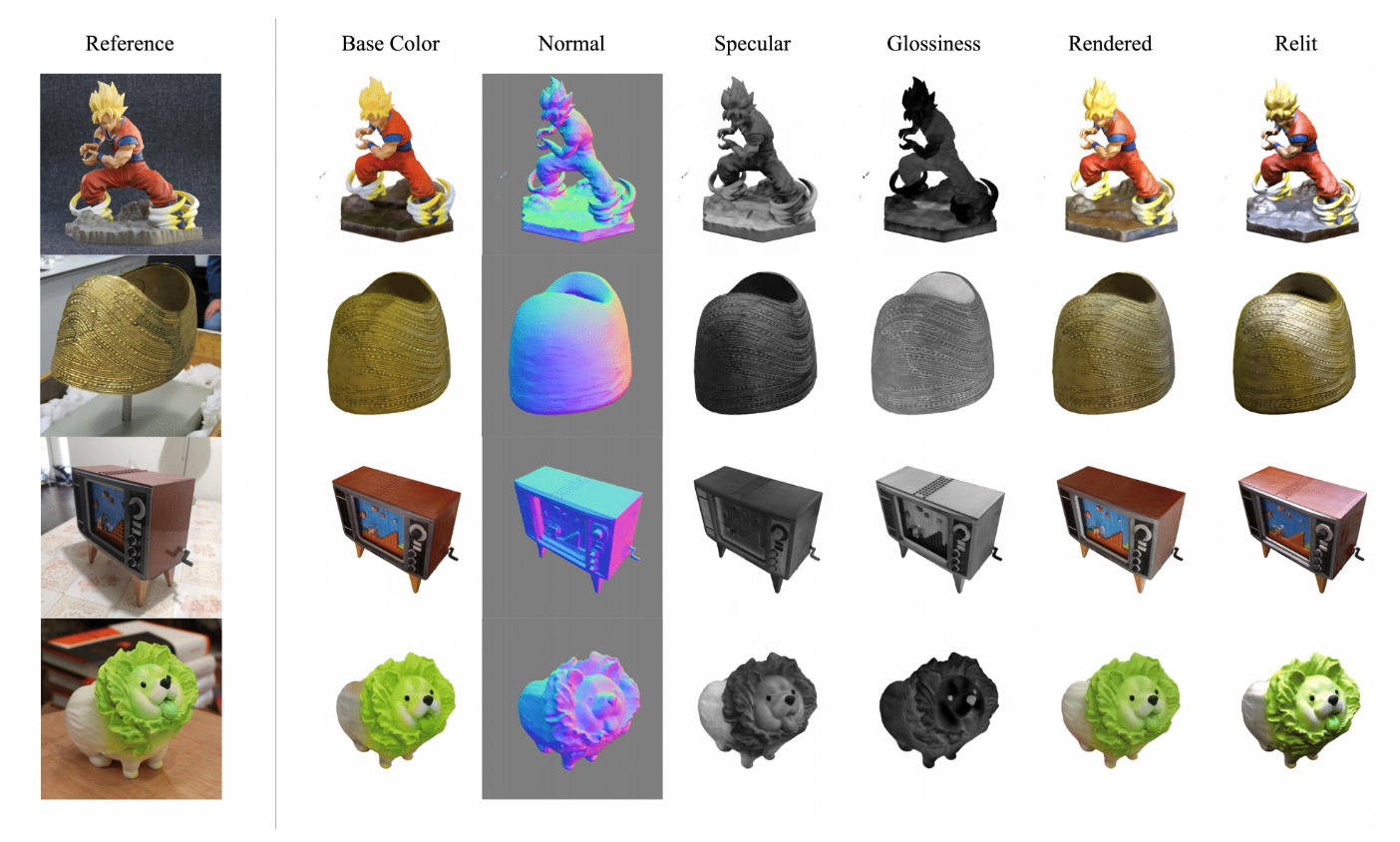This repository is the official implementation of the NeROIC model from NeROIC: Neural Object Capture and Rendering from Online Image Collections by Zhengfei Kuang, Kyle Olszewski, Menglei Chai, Zeng Huang, Panos Achlioptas, and Sergey Tulyakov.
This work has been tested on Ubuntu 20.04.
Our project page is https://zfkuang.github.io/NeROIC.
- Install required libraries.
conda env create -f environment.yaml
conda activate neroic
apt-get install graphicsmagick-imagemagick-compat-
Download our example data at here. (figure_dataset, milkbox_dataset and television_dataset)
-
Optimize the geometry network.
python train.py \
--config <path_of_the_geometry_stage_config_file> \
--datadir <path of the data> for example:
python train.py \
--config configs/milkbox_geometry.yaml \
--datadir ./data/milkbox_dataset(Optional) running the script with multiple GPU is a bit tricky: you should first run it a single GPU (which will generate the resized images), then stop the process before the training starts. Then run:
CUDA_VISIBLE_DEVICES=0,1,2,3 python train.py \
--config <path_of_the_geometry_stage_config_file> \
--datadir <path of the data> \
--num_gpus 4- Extract the normal from learned geometry.
python generate_normal.py \
--config <path_of_the_geometry_stage_config_file> \
--ft_path <path_of_the_geometry_network_weight_file> \
--datadir <path of the data> for example:
python generate_normal.py \
--config configs/milkbox_geometry.yaml \
--ft_path logs/milkbox_geometry/epoch=29.ckpt \
--datadir data/milkbox_dataset- Optimize the rendering network.
python train.py \
--config <path_of_the_rendering_stage_config_file> \
--ft_path <path_of_the_geometry_network_weight_file> \
--datadir <path of the data> for example (training with 4 GPUs):
CUDA_VISIBLE_DEVICES=0,1,2,3 python train.py \
--config configs/milkbox_rendering.yaml \
--ft_path logs/milkbox_geometry/epoch=29.ckpt \
--datadir data/milkbox_dataset \
--num_gpus 4training logs & results will be saved at logs/.
the video of novel testing views is generated on-the-fly during training, and saved under logs/. To render video with a pre-trained model, run:
python train.py \
--config <path_of_the_config_file> \
--ft_path <path_of_the_model_weight_file> \
--datadir <path of the data> \
--i_video 1 \
(optional) --test_img_id <index_of_the_reference_image>We provide additional testing scripts for material decomposition and relighting.
To decompose materials:
python test_material.py \
--config <path_of_the_rendering_stage_config_file> \
--ft_path <path_of_the_rendering_network_weight_file> \
--datadir <path of the data> To relight the model (panoramic exr HDRI maps are prefered):
python test_relighting.py \
--config <path_of_the_rendering_stage_config_file> \
--ft_path <path_of_the_rendering_network_weight_file> \
--datadir <path of the data> \
--test_env_filename <path_of_the_envrionment_map> To train NeROIC with your own collected data, click here.
Our two-stage model takes images of an object from different conditions as input. With the camera poses of images and object foreground masks acquired by other state-of-the-art methods, We first optimize the geometry of scanned object and refine camera poses by training a NeRF-based network; We then compute the surface normal from the geometry (represented by density function) using our normal extraction layer; Finally, our second stage model decomposes the material properties of the object and solves for the lighting conditions for each image.
Given online images from a common object, our model can synthesize novel views of the object with the lighting conditions from the training images.
nvs.mp4
material.mp4
relighting.mp4
If you find this useful, please cite the following:
@article{10.1145/3528223.3530177,
author = {Kuang, Zhengfei and Olszewski, Kyle and Chai, Menglei and Huang, Zeng and Achlioptas, Panos and Tulyakov, Sergey},
title = {NeROIC: Neural Rendering of Objects from Online Image Collections},
year = {2022},
issue_date = {July 2022},
publisher = {Association for Computing Machinery},
address = {New York, NY, USA},
volume = {41},
number = {4},
issn = {0730-0301},
url = {https://doi.org/10.1145/3528223.3530177},
doi = {10.1145/3528223.3530177},
journal = {ACM Trans. Graph.},
month = {jul},
articleno = {56},
numpages = {12},
keywords = {neural rendering, reflectance & shading models, multi-view & 3D}
}Acknowledgements: This work borrows many code from NeRF-pl. We thank the author for releasing his code.


